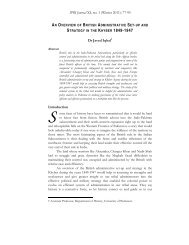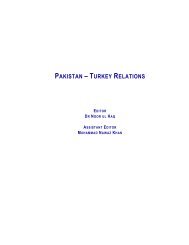120 Whither Kashmir? (Part II) - Islamabad Policy Research Institute
120 Whither Kashmir? (Part II) - Islamabad Policy Research Institute
120 Whither Kashmir? (Part II) - Islamabad Policy Research Institute
You also want an ePaper? Increase the reach of your titles
YUMPU automatically turns print PDFs into web optimized ePapers that Google loves.
46 IPRI Factfile<br />
otherwise. War, though engaged upon more than once, is the instrument<br />
least likely to induce an acceptable outcome.<br />
Hence the world needs to understand what drives those young boys<br />
lobbing stones in Srinagar when they chant ‘azadi’ or ‘freedom’. After all,<br />
<strong>Kashmir</strong>i leaders interpret the word differently. To some it means<br />
freedom from India, to others it is freedom from both India and Pakistan;<br />
then there are those who believe that the resistance is to end repression.<br />
One, two or all three could be correct. But whatever these youths want,<br />
they have been wanting it so much and for so long that the hand of fate is<br />
conspiring to help them achieve it.<br />
First, President Obama’s revised Af-Pak strategy and the<br />
subsequent London Conference in late January made it clear that<br />
Pakistan is the only viable exit road from Afghanistan — and naturally,<br />
the road to <strong>Islamabad</strong>’s fullest cooperation passes through <strong>Kashmir</strong>. Gen<br />
Ashfaq Kayani’s straight-talking at NATO the other week defined this<br />
paradigm in clearer terms when he informed the world that as long as<br />
Pakistan had issues to settle with India, it simply could not ignore the<br />
Indian threat. NATO tired and roughed-up in the merciless Afghan<br />
terrain, is fully aware that if there is one military out there that has the<br />
mettle to tame the Taliban in the medium and long run, either peacefully<br />
or by other means, it is the Pakistan Army. So they had to be listening to<br />
Gen Kayani’s words carefully and indeed they did: at stake is not just the<br />
beaten track of Central Asia but the prestige of the world’s supposedly<br />
greatest military alliance — NATO. Who would take it seriously any<br />
more if it was seen as being defeated by a primitive and ragtag militia<br />
called the Taliban?<br />
Secondly, the appointment of Shiv Shankar Menon as the national<br />
security adviser to the Indian prime minister could be a good omen for<br />
the peace process. Coming from once troubled southern India, the former<br />
envoy to <strong>Islamabad</strong> and Beijing served as India’s foreign secretary during<br />
eventful times in the last round of the peace process.<br />
Menon is reviled by the media hawks and a section of the<br />
establishment for his pro-peace inclination; he belongs to a new<br />
generation of diplomats that see the dividends of peace in a broader<br />
context. I met him with a group of former diplomats and PPP and PML<br />
politicians in 2006, on the sidelines of a peace conference in Delhi, and<br />
found him keen to help his government build bridges with Pakistan and<br />
work towards dispute resolution.




